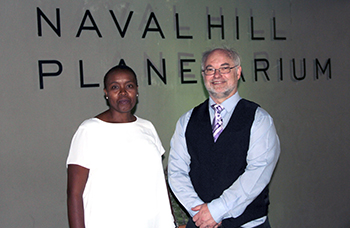Latest News Archive
Please select Category, Year, and then Month to display items
12 October 2020
|
Story Arina Engelbrecht
|
Photo Supplied
 Arina Engelbrecht from Organisational Development and Employee Well-being believes physical activity has a number of benefits for one’s health, including stress relief.
Arina Engelbrecht from Organisational Development and Employee Well-being believes physical activity has a number of benefits for one’s health, including stress relief.
Being physically active plays a big role in preventing the development of mental-health problems and in improving the quality of life of people experiencing mental-health problems.
Treatment for depression
Physical activity can be an alternative treatment for depression. It can be used as a stand-alone treatment or in combination with medication and/or psychological therapy. It promotes all kinds of changes in the brain, including neural growth, reduced inflammation, and new activity patterns are formed that promote feelings of calm and well-being. It releases endorphins – powerful chemicals in the brain that energise your spirit and make you feel good.
Physical activity can be very effective in relieving stress. Research in adults has found that physically active individuals tend to have lower stress levels compared to individuals who are less active. It also leads to improved sleep. When a person sleeps better and feels more rested, overall quality of life improves. They cope better with daily life stressors.
Reduce Alzheimer's risk
Regular physical activity can reduce your risk of developing Alzheimer's disease by up to 50%. It can also slow down further deterioration in those who have already started to develop cognitive problems. It stimulates the brain’s ability to maintain old connections as well as to make new ones.
A study asked people to rate their mood immediately after periods of physical activity (e.g. going for a walk/run, cycling, doing housework) and periods of inactivity (e.g. reading a book or watching television). Researchers found that participants felt more content, more awake, and calmer after being physically active compared to after periods of inactivity.
In conclusion, people who are physically active feel a sense of well-being, feel more energetic throughout the day, sleep better at night, have sharper memories, and feel more relaxed and positive about themselves and their lives.
“Being physically active not only changes your body, it changes your mind,
attitude, and your mood.” – Arina Engelbrecht
An out-of-this-world experience
2015-12-14

Film premiere hosts Professor Matie Hoffman, manager of the Naval Hill Planetarium and the planetarium’s operations manager, Tina Mangope. |
The Naval Hill Planetarium in Bloemfontein premiered two new short astronomy films on 4 December 2015, with marvellous cosmic visuals explaining how the earth and all the planetary formations in our galaxy and the universe were created.
The two films, aptly titled ‘Cosmic Collisions’ and ‘Journey to the Stars’, were both made to enhance people’s knowledge about the universe and the vast dynamics within it. They were donated to the Bloemfontein-based planetarium by the American Museum of Natural History in collaboration with several other US space science intuitions, including the National Aeronautics and Space Administration (NASA).
“These two fantastic state-of-the-art films are scientifically accurate and very expansive,” said Professor Matie Hoffman of the Department of Physics and Astronomy at the University of the Free State. Hoffman is also the planetarium’s manager.
Nestled in the bushy landscape of historic Naval Hill - also home to the iconic statue of Nelson Mandela and the Franklin Game Reserve - the Naval Hill Planetarium was opened in 2013. It is the first digital planetarium in Sub-Saharan Africa, and is situated at the old Lamont-Hussey Observatory Building, which was closed in 1972.